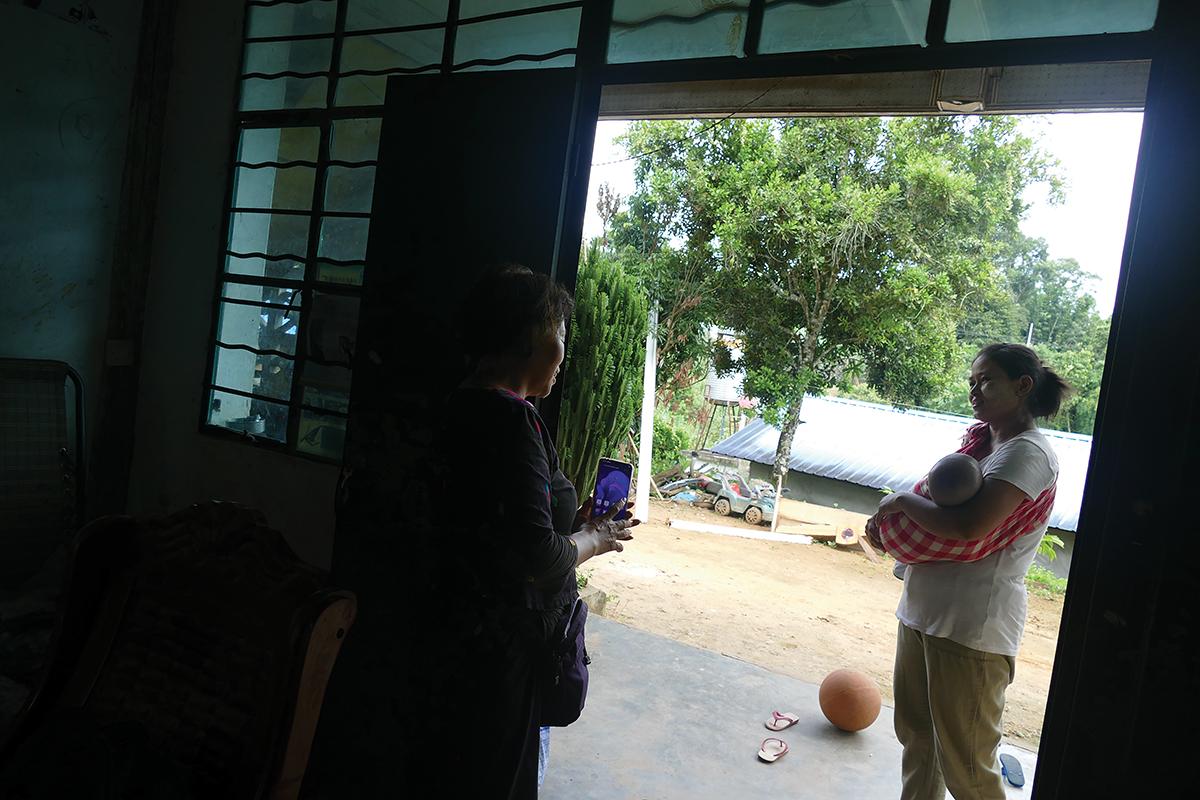
by Xiaobo Su, Professor, Department of Geography
In August 2023, at the entrance of Muke village, an ethnic Jingpo (equivalently, Kachin in Myanmar) village one kilometer away from the China–Myanmar border, I and my interpreter parked our car and stopped by a snack shop to learn where to find the village head for more information about cross-border marriage. The female owner, Ruishan, was a Myanmar wife originally from Kachin state, just across the border. Ruishan said that she was introduced by her relative in 2009 to marry her current Chinese husband, who was also an ethnic Jingpo. Their marriage followed local traditions. What most bothered Ruishan was that the couple did not have a formal marriage certificate. Nor was she granted a status of permanent residency. She dreamed that she could receive China’s National Identification Card (NIC) so that she can travel as easily as Chinese citizens. If she had her own NIC, she planned to take a flight, as she had never boarded a plane. Without the NIC, she was afraid to leave Muke for another place. After ten years in Muke, Ruishan is still an alien at home, and this sense of alienation will implicate her socially and spatially in Muke if the Chinese state does not change relevant regulations.
The implementation of the NIC and marriage certificates in border villages represents China’s central government’s biopolitical technique to turn borderlands into bordered lands. The tightened control over cross-border marriages inevitably impacted Ruishan and other Myanmar wives. When their first child was born in 2014, Ruishan and her husband could easily register the child as a Chinese citizen in their household registry book. When their second child was born in 2016, however, household registration required their formal marriage certificate. The application for a marriage certificate requires Ruishan to present her Myanmar passport, which is notoriously hard to obtain. Hence the couple went to Mandalay, the biggest city in northern Myanmar, to rely on a broker to apply for Ruishan’s passport. Paying an agency fee of CNY 7,000 ($986 USD)to the broker, Ruishan received a fake passport. Returning to Muke, Ruishan’s husband spent CNY 2,000 ($282 USD) doing a paternity test to verify the direct genetic relationship with their second child and thus register him in the household registry book. Ruishan noted that this whole process used up their savings and put them in debt.
Ruishan’s story may at first appear to be something of an expression of cross-border marriage, but its relevance becomes sharply apparent as it sheds light on the biopolitics of border control upon Myanmar wives in Chinese border villages. Located in Dehong Dai and Jingpo Autonomous Prefecture, in China’s Yunnan province, Muke and other border villages adjacent to Myanmar’s Shan and Kachin states host thousands of Myanmar wives. These women are not illegal border-crossers, since they hold legal documents such as the Myanmar identification certificate (in Burmese, Hmat-pon-tin) and Myanmar–China Border Crossing Permit (or red book) issued by the Myanmar Immigration Authority. Some of them have formal marriage certificates issued by the Chinese government, and others were unable to register their marriage. Despite being regarded as their local people by local border villagers, these women are rendered ambiguous in the legal system of population management in China.
The term “aliens at home” denotes an unsettled existence in which individuals experience both inclusion and exclusion. Ruishan’s story, and many others, show that their sense of home is twofold. First, these ethnic peoples have lived in the borderland for centuries and regard it as their homeland, although the borderline verified in 1960 places them into different national territories. The coethnic sentiment lingers, through grassroots efforts, to tie them together in relation to external ethnic majority groups such as Han in China or Burman in Myanmar.
Second, these Myanmar wives start new families with their spouses and children in border villages. Despite their lack of permanent residency or naturalized Chinese citizenship, they live on the Chinese side, speaking the same dialects, sharing the same habits, and enjoying the same food as other fellow Chinese. They want to be rooted in a place where they can establish their family, maintain intimate relationships, and contribute to local development, but they feel unsettled because they are deprived of citizenship. The unsettled life of Myanmar wives is juxtaposed between a homeland (Myanmar) and a homestay (China), but they cannot claim full loyalty to either home or host society for various reasons. While these Myanmar women do not worry about deportation or being regarded as illegal, their identity as Myanmar nationals generates punitive repercussions in their everyday life, including a sense of marginalization and discrimination, which constitutes a key dimension of their daily struggles in China’s border villages.
—Xiaobo Su received a 2023 CSWS Faculty Research Grant for this project.

